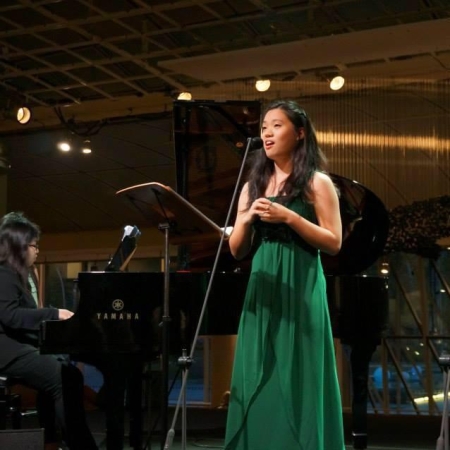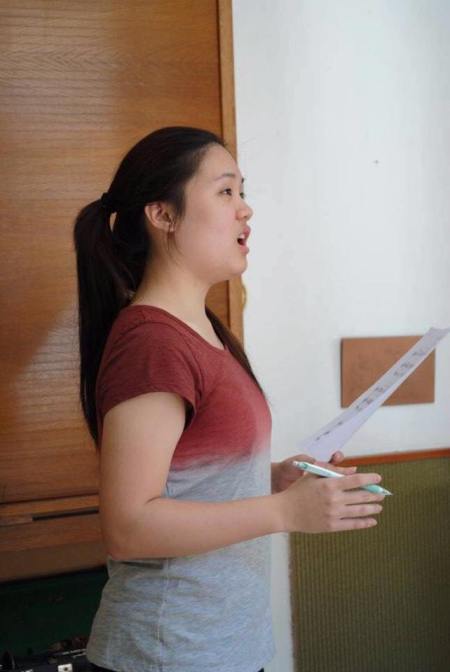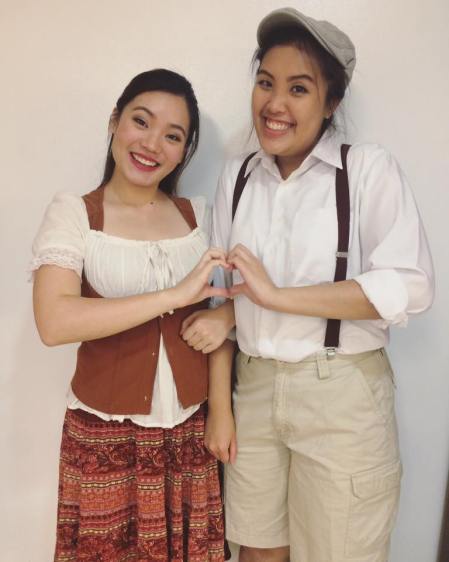“The passion never stops growing, and I’m more sure about pursuing music today than I was yesterday.”
Cherie Tse is a Singaporean soprano currently in her final year of the BMus (Hons) programme by the Nanyang Academy of Fine Arts in collaboration with the Royal College of Music, London. Having studied voice with Jessica Chen and the late Lim Shieh Yih, Tse achieved a distinction in Diploma in Music at NAFA before continuing her studies.
Prior to her upcoming engagement with the Singapore Symphony Orchestra, Tse has performed as a soloist with ensembles such as the Mus’Art Wind Orchestra, Philharmonic Winds, and Chamber Sounds. Her aptitude has won her 2nd prize in the 7th Tan Ngiang Kaw/Tan Ngiang Ann Memorial Vocal Competition and the Gold Award in the 5th Bangkok Opera Singing Competition in 2013.
Tse will be singing in SSO’s Discovering Music!: The World’s a Stage: The Drama of Opera on 5 Nov, 4PM, at the Victoria Concert Hall. Tickets are available here.
Read on for an exclusive interview with Cherie Tse by Nicholas Ong.

Tse at a masterclass in Payerbach, Austria
Thanks Nicholas. I started playing the piano at the age of 5, and my passion in music grew since then. My exam grades and affirmations from people around me sparked my eagerness to become a better pianist. And by the time I was in secondary school, I knew I couldn’t stop there, and I wanted to further my studies in music.
I understand that you switched from being a piano major to a voice major. What was it about singing or the voice that captured your heart?
Well, I’ve always liked singing, but I never thought I was good enough to do it well. Before I entered NAFA at the age of 17, classical singing was almost non-existent in my world. I thought that opera or classical singers are just born with “big” and “powerful” voices, which was something I never thought I would ever have.
It was until I had to take a minor study in voice and had my first singing lesson with the late Singaporean tenor, Mr Lim Shieh Yih, that things started to change. In that particular lesson, he asked me why wasn’t I a vocal major, and that I should consider switching it. I remember being dumbfounded, but yet having a powerful feeling inside me. That power motivated me to learn and practice diligently. I even attended all the vocal performance and language diction classes that I didn’t have attendance or exams for.
Then, as I practiced and saw myself improve each month, I really wanted to develop my potential to see how far I’m meant to go, and how much more I could grow. I learnt to appreciate this art form so much more than I ever thought. I switched major in the following academic year, and it has been one of the most important decisions I’ve made.
How did you feel when you got news that you were going to sing the two arias with the SSO?
I was very thankful to be given this chance. I would dream of singing with the SSO, but I’d never expect it to come so soon. This is definitely a bigger stage for me because I’ll be performing alongside the musicians whom I look up to. It is such an honour.
Do you feel a different (possibly higher) level of stress considering the arias that you would be singing to be amongst the most famous in the world?
There is a level of stress, but I don’t think it’s from singing the famous arias. If I were to be performing less famous works, I would also hope to deliver them equally well and effective. In fact, my familiarity with these two arias made it easier for me.
Does singing two arias with such different characters one after another pose any challenge for you?
It is okay. I would need to take a little more time to get into the character of Carmen when I sing Habanera, just because I am very different from her. I’m probably much closer to Lauretta in O Mio Babbino Caro, so it’s not difficult.
You have sung with a wind orchestra before. How different does it feel when accompanied with a full ensemble as oppose to just a piano?
The timbre of wind instruments are very different from the piano, so in itself, the sound and effects are already very different. The instrumentation is bigger in a wind orchestra, so it is harder to project a solo voice. But singing with a piano could make the voice feel more “naked” and exposed, and that could be both a good and a bad thing, depending on the intention of the composer.

Tse (left) as Chloé in Offenbach’s Daphnis et Chloé
No. Opera can be fun and entertaining to people who aren’t trained too. I believe it could be the long duration or the nature of some operas that people find boring or hard to appreciate. The foreign languages used are also barriers to the audience. But as long as there are subtitles and good direction, the story can be delivered well too. I’ve had non-musician friends telling me, to their own surprise, that they enjoyed watching opera singing in a recent comic operetta that I performed in.
Whose works are your favourite to sing?
That’s a tough one. There are many works that I like, but are written by different composers. If I have to name a few, they would be Bellini, Debussy, Reynaldo Hahn, Roger Quilter, and Puccini.
Who are some of your favourite classical singers?
Anna Netrebko and Rolando Villazon are my favourite soprano and tenor because of the clarity, brightness and lyric quality of their voices.
What are some key character traits you feel is essential to succeed in classical music, in Singapore in particular?
Talent, hard work, perseverance and guidance from the right people in the right direction.
What are your aspirations for yourself and the classical music industry in Singapore?
I hope to become one of the best Singaporean classical singers and make my country proud. I really hope that the classical music scene in Singapore expands and develops, and be recognized for our performing arts industry as well.